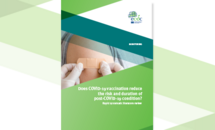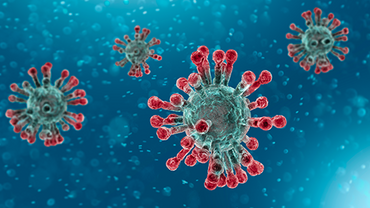Does COVID-19 vaccination reduce the risk and duration of post COVID-19 condition?
Whilst it is well established that COVID-19 vaccination protects against severe outcomes of acute SARS-CoV-2 infection, such as hospitalisation and death, there is still uncertainty as to whether vaccination also reduces the risk and/or duration of a wide range of post-acute COVID-19 symptoms, commonly referred to as ‘long COVID’.
Executive summary
Assessment of evidence is complicated by the wide range of qualifying symptoms, minimum symptom durations and time-since-infection criteria used to define ‘long COVID’ in observational studies. In response, the World Health Organization (WHO) has established consolidated clinical case definitions for post-acute COVID-19 symptoms in adults [3] and children/adolescents [4], applying the specific terminology ‘post COVID-19 condition’ (PCC), to support harmonised reporting on post-acute COVID-19 outcomes. Determining whether COVID-19 vaccination reduces the risk and/or duration of PCC may critically inform decision-making on public health interventions to reduce the burden of COVID-19 disease.
This rapid review addressed the following research questions:
- Does COVID-19 vaccination reduce the risk of developing PCC?
- Does COVID-19 vaccination reduce the duration of PCC?
The review was conducted in accordance with Cochrane methods guidance for rapid reviews of effectiveness [5], applying the following restrictions to scope: i) limiting the population to individuals who experienced PCC as defined by WHO [3,4]; ii) focusing on studies taking place in Europe or comparable contexts; iii) limiting to vaccines authorised by the European Medicines Agency (EMA) at any point in time; iv) focusing only on comparisons of full course vaccination prior to SARS-CoV-2 infection with no vaccination; v) restricting the timing of publications to after October 2021, to align with the timing of the WHO PCC case definition; and vi) focusing only on published articles and articles-in-press.
Electronic databases (EMBASE, MEDLINE, PubMed, MEDLINE In-Process and the Cochrane Database of Systematic Reviews [CDSR]) were searched for relevant publications. Additional searches were also carried out, including Google Scholar, reference lists of previously published systematic literature reviews (SLRs), relevant literature repositories, and websites of selected organisations. Data extraction was completed for relevant articles identified via title and abstract screening, and subsequent full-text review of articles to assess adherence to predefined inclusion and exclusion criteria. Risk of bias (ROB) scores were derived for included studies, applying the Newcastle-Ottawa scale (NOS) to assess the quality of cohort and case control studies, and the Joanna Briggs Institute (JBI) Critical Appraisal Checklist for analytical cross-sectional studies. ROB scores resulted in the following possible classifications: ‘low’, ‘medium’ or ‘high’.
A total of 4 303 records were identified through electronic database searches, with 3 342 of these records screened at the title and abstract stage following removal of duplicates. This resulted in 179 publications being assessed for eligibility based on their full texts, of which 171 were excluded. In addition, 227 potentially relevant records were identified via other search methods, and upon further review, 223 of these publications were excluded. Taken together, a total of 12 studies addressing the two research questions of interest were included. Eleven studies assessed whether COVID-19 vaccination reduces the risk of PCC, and one study assessed whether COVID-19 vaccination reduces both the risk and duration of PCC.
Of the 12 studies assessing whether COVID-19 vaccination reduces the risk of PCC, nine assessed risk for general adult populations (ROB: low 7, medium 1, high 1), two assessed risk for immunocompromised adult populations (ROB: low 1, high 1) and one assessed risk for a general child/adolescent population (ROB: high). For general adult populations, six studies assessed as having low ROB found that full vaccination prior to infection had a statistically significant effect on reducing PCC compared to no vaccination. These studies represented a range of recruitment settings (including both community and hospital settings), time period of infection (and consequently SARS-CoV-2 variant), as well as acute COVID-19 disease severity. For immunocompromised populations, one community-based study of adults living with HIV was assessed as having low ROB and reported no statistically significant difference between risk of developing PCC symptoms between vaccinated and unvaccinated groups. For child/adolescent populations, no studies were assessed as having a low ROB. Factors affecting the interpretation of studies assessed as having medium or high ROB included: i) comparability of cohorts in studies, specifically that results were not adjusting for confounding factors that may have affected the outcomes reported; and ii) reporting of follow-up − that some studies did not specify whether any of the participants initially selected were lost to follow-up. In addition, two of the three studies which did not find that vaccination reduced PCC had small sample sizes,
particularly where symptoms were assessed in sub-group analyses. Furthermore, timing of vaccination prior to SARS-CoV-2 infection was not reported across all studies.
A meta-analysis of comparable studies assessing whether COVID-19 vaccination reduces the risk of PCC for general adult populations was conducted to generate a pooled effect estimate. Four studies of sufficient quality (ROB: low) were included. Using a random-effects model, the pooled adjusted odds ratio (OR) was 0.73 (95% CI: 0.62–0.85), suggesting that full vaccination prior to acute infection could reduce the risk of PCC by 27% relative to no
vaccination for general adult populations.
With regard to duration, no longitudinal studies were identified that evaluated the persistence of PCC symptoms in a defined PCC cohort at multiple time points (e.g. at 6, 12, 18 and 24+ months). However, one study (ROB: low), sampling from an adult hospitalised population, which categorised PCC to major physical symptoms (MPS) or major neuropsychological symptoms (MNS), evaluated persistence of PCC symptoms at 12- and 18-months post discharge. While results indicated that vaccination may reduce the duration of MPS, no effect was found for MNS. However, interpretation of these findings is challenging due to limited sample size.
In conclusion, a review of available literature indicates that, in general adult populations of mixed disease severity, vaccination offers some degree of protection against PCC onset, aligning with findings from previous reviews into this area of research. This indicates that vaccination offers additional benefits beyond protecting against severe acute outcomes of SARS-CoV-2 infection for this population. There were insufficient well-designed studies to draw specific conclusions as to whether COVID-19 vaccination reduces the risk of PCC for general child/adolescent or immunocompromised populations. Furthermore, there were insufficient well-designed studies to assess if vaccination reduces PCC symptom duration. This review highlights the ongoing need for further studies evaluating PCC that consistently apply the WHO case definitions.
Download








